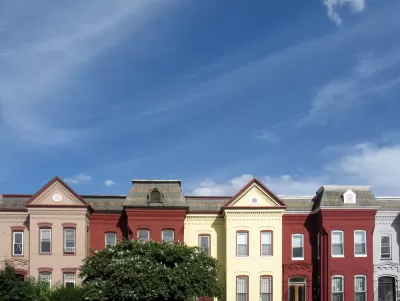Owners of rowhouse properties in Washington D.C. will no longer be able to add height and density by building pop-ups. The construction provoked the ire of aesthetically minded critics and, now, the regulatory controls of the District's zoning code.

"The District’s Zoning Commission gave final approval Monday night to new regulations governing the 'pop-up' homes sprouting up in some of the city’s gentrifying neighborhoods, reducing the maximum height of single-family rowhouses to 35 feet from 40 feet," reports Ian Shapira.
"In a surprising reversal from a preliminary vote in late March, the commission also voted to limit developers to building two 'by-right' condo units in a pop-up, a renovated rowhouse with an added story or added stories often towering over neighboring homes. A third or fourth unit would require a special exception from the city."
According to Shapira, the decision concludes a contentious debate that persisted for over a year across the District. The article includes more detail about the politics of the decision and provides soundbites from the commission hearing.
FULL STORY: D.C. zoning panel approves new regulations for pop-up rowhouses

Maui's Vacation Rental Debate Turns Ugly
Verbal attacks, misinformation campaigns and fistfights plague a high-stakes debate to convert thousands of vacation rentals into long-term housing.

Planetizen Federal Action Tracker
A weekly monitor of how Trump’s orders and actions are impacting planners and planning in America.

In Urban Planning, AI Prompting Could be the New Design Thinking
Creativity has long been key to great urban design. What if we see AI as our new creative partner?

King County Supportive Housing Program Offers Hope for Unhoused Residents
The county is taking a ‘Housing First’ approach that prioritizes getting people into housing, then offering wraparound supportive services.

Researchers Use AI to Get Clearer Picture of US Housing
Analysts are using artificial intelligence to supercharge their research by allowing them to comb through data faster. Though these AI tools can be error prone, they save time and housing researchers are optimistic about the future.

Making Shared Micromobility More Inclusive
Cities and shared mobility system operators can do more to include people with disabilities in planning and operations, per a new report.
Urban Design for Planners 1: Software Tools
This six-course series explores essential urban design concepts using open source software and equips planners with the tools they need to participate fully in the urban design process.
Planning for Universal Design
Learn the tools for implementing Universal Design in planning regulations.
planning NEXT
Appalachian Highlands Housing Partners
Mpact (founded as Rail~Volution)
City of Camden Redevelopment Agency
City of Astoria
City of Portland
City of Laramie



























